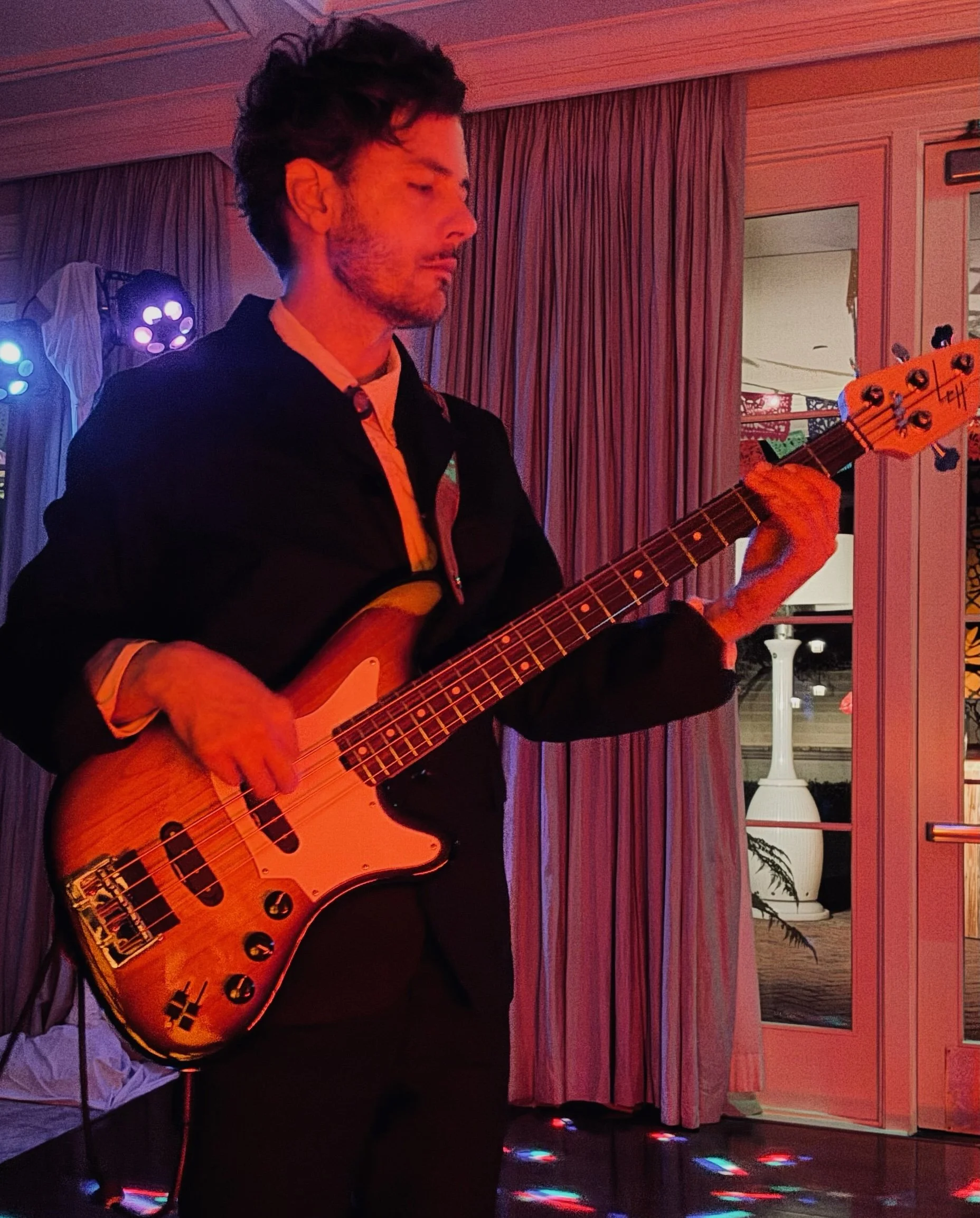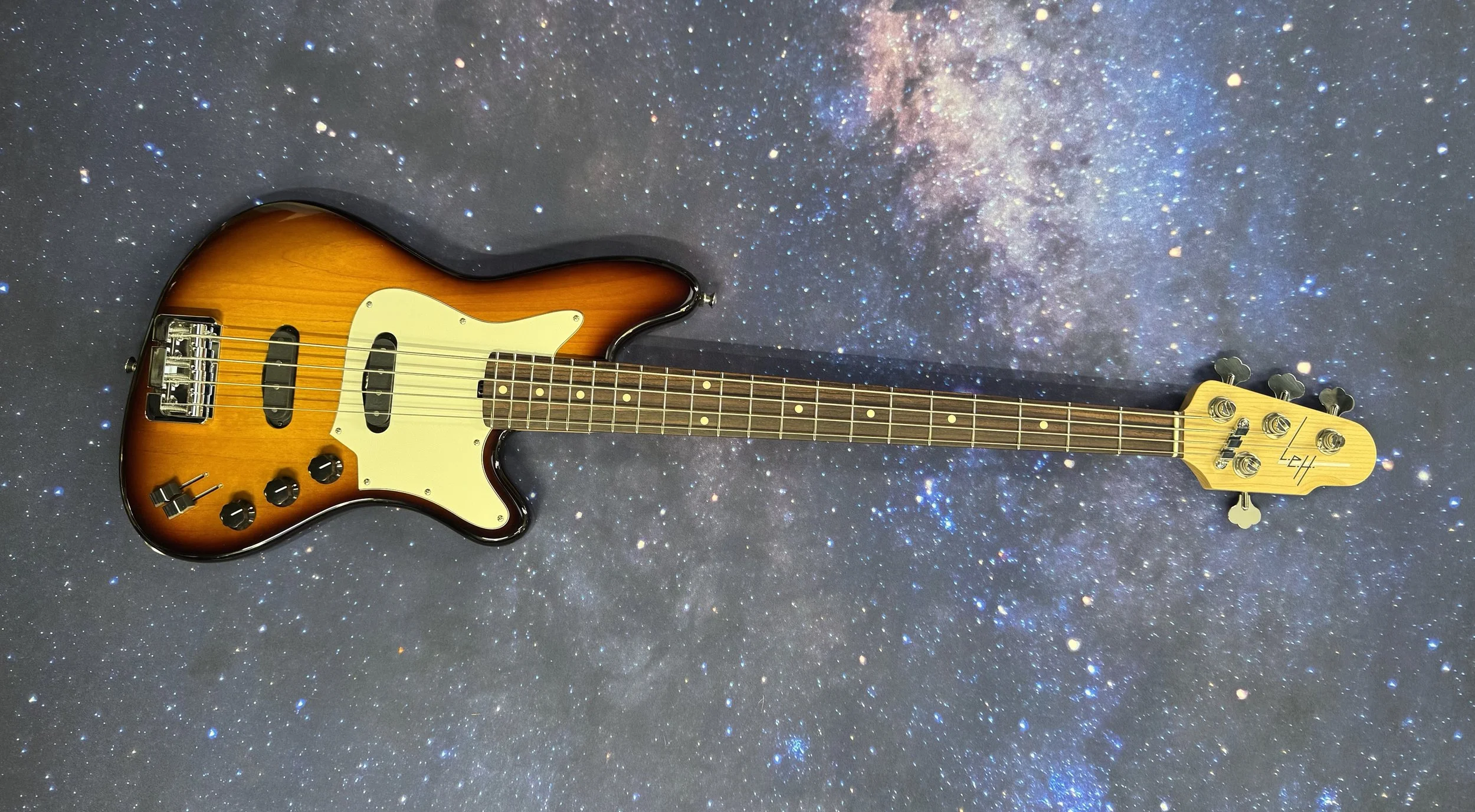Jordan Brooks: On His LEH Bass
Jordan Brooks is a connoisseur of tone, which is evident if you listen to any of the many albums he’s featured on. From A$AP Rocky and J. Cole to Schoolboy Q to Bosco to his most recent work with dub star Pachyman, his bass sound is a perfect blend of warm, present, deep, and smooth. His meticulous nature about his tone is just part of what has made this New York-to-Los Angeles transplant so in demand as a session and touring bassist. His releases with his own duo project, Ex-Poets, showcase his soulful, laid-back playing that focuses on movement, groove, and pocket.
Always searching out the best gear to convey his sound, Brooks is often seen playing Hofner, Olinto, and Fender basses, but his recent acquisition of an LEH bass has changed his bass lineup alotgether. Having known Ellis Hahn from their time at Sadowsky, Brooks was thrilled to get his hands on his Voyager bass, which is the exact blend of vintage and modern tone that he’s been searching for. Now equipped with it for his upcoming studio sessions and summer tour with Pachyman, this low end aficionado is taking his sonic expression to the next level.
What have you been working on recently?
It feels like every week is a different thing but as long as I have a bass in my hands, I’m happy. I recently went to Austin to play some shows with my friend Jo Alice who is a great singer/songwriter and my girlfriend sang background vocals. It was actually our first time performing together on stage which was super fun. Her name is Jenna Green and we’re finishing her debut EP now. I’m touring with Pachyman in Europe in May and then some more stuff later in the year. I’m recording a song with Weyes Blood this weekend for a movie which should be cool because I’m a fan. I’m always keeping busy playing and producing every week, a lot of time I’ll play bass remotely for people and send it out.
You’ve been touring with Pachyman this year. What’s that experience been like for you musically?
I love Pachyman and I think he’s one of the greatest artists out there. I’m a dub fanatic. We met randomly because Pachy just happened to see me play at a cool dive bar in LA. We talked after and he asked if I’d be interested in jamming. I went over to his place some weeks later and played and the sound immediately clicked. I remember he said “yeah you get it,” which to me was great to hear, because I told him that reggae is probably the style I’ve studied most. Playing with Pachy feels like something I’ve been preparing for and waiting to do for so long, and he's the real deal. His bass lines are so good along with his tones and feel. It couldn’t be more fun to play live, especially as a bass player.
You recently recorded with A$AP Rocky and J. Cole. How did that go down?
That was so crazy because I happened to be in New York playing a one-off show with Pachyman and I stayed for a few extra days in Brooklyn to show my girlfriend around where I used to live. We were at the airport getting ready to leave and my friend, the great producer Rex Kudo, called me and asked if I was still in New York. I told him I was in line at security at the airport and he asked me to come to a session. I thought about it for a sec and then actually left the airport, hopped straight on the train with my bass and went to record which ended up being at A$AP Rocky’s house. Rocky was so cool and welcoming. We immediately hit it off. He loves bass, he loves jazz and is just a huge music fan and curious person. I recorded and he asked me to come back again the next day and it ended up turning into a four-day session. One night we even drove over to Small’s and jammed with Jon Batiste. One of the wildest weekends of my life.
You recorded on the last album by Schoolboy Q. How did you first begin collaborating with him?
I got a call from DJ Fu asking if I could come add bass to a song. When I got there I fully expected it to just be the producer and me, as it often is, but Q was there practicing putting with a golf club in the studio. He said what’s up and I recorded the bass. They both dug it and asked if I could stick around and play more. It ended up turning into a bunch of sessions. It was very cool because I had pretty recently moved to LA and there were different musicians and producers coming through every day and I got to meet and work with a lot of incredibly talented people.
What is your writing and woodshedding process like when you first get a call from an artist?
That’s a good question because it’s something I think about a lot. Playing along to a recording at home and playing live are two totally different things, but a lot of times people don't realize how different they can be. When I’m prepping for a gig, I try preparing for what would be the worst-case-scenario in terms of live sound. Sometimes you can't hear the vocals whatsoever, sometimes a musician came in at the wrong spot, sometimes musical pieces that you instinctually relied on as a cue from the record aren’t there or can't be heard. Sometimes the stage is huge and everyone is all spread out and you can only hear bits and pieces of what’s going on. To prepare for all of that, I write out every song so that I know the structure so well that even if I was playing totally alone, I could still nail all the bass parts and section changes by myself. Eventually it all gets memorized but it’s a good starting point and failsafe to make sure you’re totally solid.
What is your ideal bass tone and how do you achieve it?
My ideal bass tone changes song to song based on what it needs and what can fit. But if it’s a totally blank slate then it’s something warm and wooden that blooms. As for achieving the tone, first is having the sound in your head that you want. Then you have to get a really nice instrument. Everything after that is secondary. Having the right strings is really important too, but if you have a nice bass, as long as the preamp or amp or whatever recording device you plug into doesn’t totally suck and is somewhat high quality, it’ll sound good.
How and when did you first play an LEH bass?
Ellis built me a P-bass a while back when they worked at Sadowsky and it was stellar and my main bass for a long time. I used to live right by Sadowsky in Brooklyn and I would always request Ellis do my setups and repairs because their work was fantastic. Fast forward many years and I walked by the LEH booth at NAMM and we re-connected. I played an LEH bass and it was amazing. That was about six years ago and the sound and feel of that bass has always stuck with me, even through all the basses I’ve played since. When I saw that Ellis started dabbling in short scales and medium scales and had one available that seemed more in the vintage realm, I knew it was time to grab one.
What was your first impression of the bass when you got it?
My first impression was: 1. it is beautiful and 2. Ellis is pushing bass building into the future with their design choices. It’s just classic enough to look rooted in tradition but there's all these space-age little details and design improvements that bring it to the next level.
What is it about LEH basses that you love?
Man, so many things. Where do I even start? Well first the sound. It has a lot of character kind of like my Hofner, but it takes up a little less space in the mix. It’s also way more versatile because of the two pickups, so it can be punchier or thinner. I love being able to adjust the sound of a bass on the spot on the actual bass without needing a preamp or EQ pedal. Sometimes the amp is far away on stage or I don’t even have an amp or I’m moving quickly in a session, so the versatility and adjustability definitely helps. All the sounds on it are really natural though. It records soooo well.
Then the playability is second to none. It’s just perfectly built. The way the neck pocket is shaped and joined to the body, the fretwork, the balance of the body, the contouring. It is so easy to play, so in tune, and so resonant, but without sounding sterile or anemic. That’s a tough thing to achieve. You usually get one or the other in my experience – a quirky cool sounding bass that is hard to play or a perfectly playing in-tune bass that sounds very bland and boring. Ellis managed to conquer that conundrum.
What is it like working with Ellis on your builds?
Ellis is the perfect cross section of chill and professional. Easy going and open to new ideas but knows how to get things done and has a solid vision and execution. They also know how to interpret what someone says they need out of an instrument, which is often quite abstract. Ellis guides them and turns it into a reality.
What’s the best advice you’ve ever been given about bass?
I can say three things that are hugely important that have stuck with me:
1. When you’re playing, the music and the people you’re with should sound better than they would if you weren’t standing there. Ron Carter said that and that’s really stayed central as my main goal ever since.
2. When I was playing with Nigerian percussionists for my first big show, there were about 300 people there and right before we went onstage, they said, ok make sure to not miss a note because if you do everyone will notice and stop dancing. I thought they were being hyperbolic or comedic, but they were dead serious. It does sound funny but I think it speaks to the importance and power of bass especially in dance music and bigger stages because having that consistency of tone and good playing can really make or break a band–even if it’s the simplest, most repetitive bass part in the world. Every note on bass is impactful and knowing how to capitalize on that is what separates an adequate bass player from a great one.
3. Aston “Familyman” Barrett famously said “the drums are the heartbeat and the bass is the backbone” of the band. It took me a while but now I totally get what he meant. The drums pump blood and energy into the music by creating the dynamics and the flow, while the bass holds everything together as the glue. The key with bass is finding a part that brings all the other parts together in the right way. I think that’s why Paul McCartney liked to record his bass last whenever possible, because he could have a chance to bring everything together in its final context.
Follow Jordan: HERE








